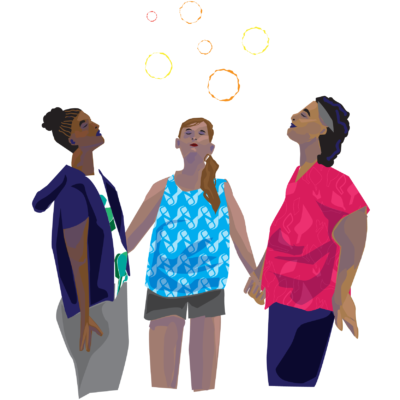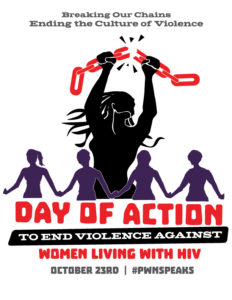While there are no easy answers, PWN, with the support of our partners at National Network to End Domestic Violence, has produced and curated some resources for women living with HIV experiencing IPV (or coping with the trauma of past IPV) and for HIV and IPV service providers that we hope will be helpful during this extraordinarily difficult time.

An open letter to all women living with HIV who are experiencing violence in their relationships/homes
WE SEE YOU. WE HEAR YOU. WE ARE WITH YOU.
We know you are out there, in every state, city, county and neighborhood. This ever-evolving COVID-19 pandemic is creating a dangerous situation for many–but of course, you already know that.
For many of us, a shelter-in-place/stay-at-home order due to the COVID-19 pandemic creates unexpected challenges and anxieties about health, money, our loved ones’ safety, and numerous other concerns. For others, it comes with additional danger and vulnerability to abuse women experience in their homes. For those already subjected to structural and institutional violence (racism; transphobia; employment discrimination; agencies that do not meet our needs; surveillance and criminalization by law enforcement; inadequate access to health care; economic policies that leave us out; communities that shun us), the opportunities for violence in the home is increased with a stay-at-home order.
Many women are working in this stressful environment, which can also cause added tension in homes and can increase risk for violence. People who experience domestic or sexual violence; LGBQ, trans, and non-binary folks; immigrants; undocumented folks; and women of color have historically learned to distrust institutions (police, agencies, etc.) to help when help is needed most. Living with HIV adds another layer to relationships, where we choose to live, work and play. And is certainly a factor for many women in relationships that involve violence.
We want you to know, we are here for you.
We have collected and co-created some resources for people currently experiencing IPV, as well as for HIV and IPV service providers, which you will find on this page. If you have resources you would like to contribute, including blogs about your personal experience with IPV, please contact communications(at)pwn-usa.org.
We don’t have all the answers, this pandemic is uncharted territory. But PWN is here to be with you in finding some possible resources, tactics, solutions, and to JUST BE HERE. We are here to help explore what safety might look like in this uncertain time. We know that as women living with HIV, we are stronger together, and this is not the first virus we have come together over!
Know that we are with you, we love you, and together, #WeGotThis!



 PWN established October 23 as a Day of Action to End Violence Against Women Living with HIV in 2014 in the wake of two brutal murders of women following disclosure of their HIV status. Over the past five years, we have used the Day of Action to raise awareness to the many different forms of violence faced by women and people of trans experience, from intimate partner violence to structural violence such as attacks on our economic security and reproductive freedom.
PWN established October 23 as a Day of Action to End Violence Against Women Living with HIV in 2014 in the wake of two brutal murders of women following disclosure of their HIV status. Over the past five years, we have used the Day of Action to raise awareness to the many different forms of violence faced by women and people of trans experience, from intimate partner violence to structural violence such as attacks on our economic security and reproductive freedom.